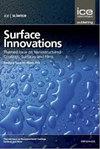Effects of asymmetric cooling and surface wettability on the orientation of the freezing tip
IF 3.5
4区 材料科学
Q3 CHEMISTRY, PHYSICAL
引用次数: 1
Abstract
Freezing of water droplets placed on the bare and superhydrophobic surfaces of polymer wedges is studied both experimentally and computationally. Two-dimensional numerical calculations of the transient temperature field in a chilled polymer wedge show that the direction of heat flux from the droplet through the thermal contact region with the wedge differs significantly from the normal to the wedge surface. A novel approximate computational model is proposed that takes into account the variable area of the water freezing front in the droplet. This model gives a quantitative estimate of the faster freezing of the droplet on the bare surface. The obtained numerical results agree with the laboratory measurements. The velocity of the crystallization front and the droplet deformation including the so-called freezing tip formation are monitored in the experiment. The direction of the freezing cone axis appears to be noticeably different for the cases of bare and superhydrophobic wedge surfaces. This is explained by the fact that the direction of the freezing cone axis is controlled by the local direction of the heat flux. For a hydrophobic wedge surface, the deviation of the freezing tip from the vertical is smaller, because the reduced thermal contact area reduces the influence of the heat flux direction at the wedge surface.非对称冷却和表面润湿性对冻结尖端取向的影响
通过实验和计算研究了放置在聚合物楔裸露和超疏水表面上的水滴冻结。冷却聚合物楔中瞬态温度场的二维数值计算表明,从液滴通过与楔的热接触区域的热通量方向与楔表面的法线有很大不同。提出了一种新的近似计算模型,该模型考虑了液滴中冻结前沿的可变面积。该模型给出了液滴在裸露表面上更快冻结的定量估计。所获得的数值结果与实验室测量结果一致。在实验中监测结晶前沿的速度和液滴变形,包括所谓的冻结尖端的形成。对于裸露和超疏水楔形表面的情况,冻结锥轴的方向似乎明显不同。这可以通过以下事实来解释:冷冻锥轴的方向由热通量的局部方向控制。对于疏水性楔形表面,冷冻尖端与垂直方向的偏差较小,因为减少的热接触面积减少了楔形表面处热通量方向的影响。
本文章由计算机程序翻译,如有差异,请以英文原文为准。
求助全文
约1分钟内获得全文
求助全文
来源期刊

Surface Innovations
CHEMISTRY, PHYSICALMATERIALS SCIENCE, COAT-MATERIALS SCIENCE, COATINGS & FILMS
CiteScore
5.80
自引率
22.90%
发文量
66
期刊介绍:
The material innovations on surfaces, combined with understanding and manipulation of physics and chemistry of functional surfaces and coatings, have exploded in the past decade at an incredibly rapid pace.
Superhydrophobicity, superhydrophlicity, self-cleaning, self-healing, anti-fouling, anti-bacterial, etc., have become important fundamental topics of surface science research community driven by curiosity of physics, chemistry, and biology of interaction phenomenon at surfaces and their enormous potential in practical applications. Materials having controlled-functionality surfaces and coatings are important to the manufacturing of new products for environmental control, liquid manipulation, nanotechnological advances, biomedical engineering, pharmacy, biotechnology, and many others, and are part of the most promising technological innovations of the twenty-first century.
 求助内容:
求助内容: 应助结果提醒方式:
应助结果提醒方式:


